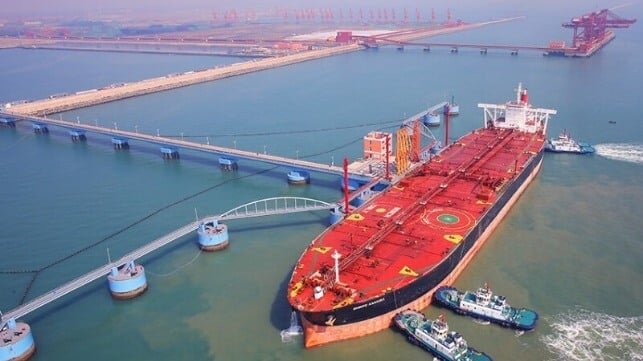China’s Shandong Port Group Implements Ban on Tankers under U.S. Sanctions
China’s state-owned Shandong Port Group has recently unveiled a new policy set to take effect in 2025, which will prohibit tankers under U.S. sanctions from utilizing its port facilities. This exclusive information was disclosed by Reuters, following the circulation of memos among traders outlining the details of the ban.
The memos obtained by Reuters revealed that Shandong Port Group has instructed its ports to refrain from docking, unloading, or providing services to vessels listed on the Office of Foreign Assets Control list managed by the U.S. Department of State.
If enforced, this ban could have significant repercussions, particularly for Iran, which heavily relies on shipping its oil to China. According to a recent report by the NGO United Against a Nuclear Iran (UANI), Iran’s oil exports witnessed a notable increase of 10.75 percent in 2024, totaling 587 million barrels. China emerged as the primary destination for these exports, receiving 533 million barrels, representing a 24 percent surge from the previous year. China currently accounts for 91 percent of Iran’s total oil exports, up from 83 percent in 2023.
Shandong Port Group, a prominent player in China’s port industry with operations in Yantai, Quingdao, Rizhao, and Bohai Bay Port, hosted its year-end presentation where Li Zhi, President of Dongming Petrochemical Group Co., emphasized the group’s commitment to ensuring national energy security and fostering regional economic growth through the development of a reliable crude oil transportation network. The group’s crude oil imports constitute over a third of the country’s total imports, solidifying its position as a crucial global energy supply chain hub.
While Shandong Port Group downplayed the potential impact of the ban by stating that most oil shipments arrive on tankers not subject to sanctions, UANI has urged Western nations to expand sanctions to target repeat offenders engaged in oil transfers via ship-to-ship exchanges. Reports have indicated instances of Chinese tankers participating in these transfers off ports like Singapore and Indonesia.
Amid escalating tensions in the Middle East, primarily fueled by Iran’s alleged support for militant groups like Hamas, Hezbollah, and the Houthis, the U.S. has intensified sanctions on Iranian oil exports. The focus has also extended to curbing illicit activities within the Russian oil trade network.
Speculations suggest that China’s move to implement the ban may be part of broader trade negotiations with the incoming Trump Administration, aimed at averting potential tariffs. As the global energy landscape continues to evolve, the dynamics of oil trade and geopolitical alignments are set to shape the future trajectory of international relations.

